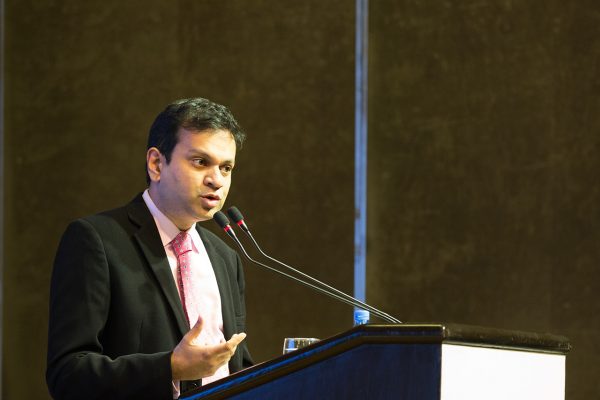Reading Time: 3 minutes
Shayera Begum defied all odds to become a leader in the male-dominated field of construction in her community. It was a fifteen-year long, treacherours and, oftentimes, lonely journey to the destination. Read more to learn how Shayera banked on her resolve to overcome her circumstances.
Name an industry dominated by men.
Construction.
This might just be one of the first industries that comes to one’s mind. So, what does it take for a woman to break into this so-called ‘man’s world’ and make it to the top?
For the 40-year-old Shayera Begum, it took rebar-strong determination and an unyielding struggle of fifteen years. Starting out as a day labourer at the construction site in a remote corner of Bangladesh, to becoming a head-mason, respected by all in her community, it’s a story which dreams are made of – dreams that are moulded by subjected reality.
It all started with a dream. Growing up, Shayera had this unorthodox dream – to become a mason someday. Unlike many of her peers, playing with clay, bricks and cement, amused her.
Having reached her childhood dream, she now harbours another one – of equal pay – on-par with her fellow male colleagues.
“Now, I dream of equal pay, shoulder-to-shoulder with my male mason colleagues. Though, I call it a dream but deep inside, I know it’s my right”, says Shayera Begum.
Breaking taboos and building abodes
Shayera is a mother of three and the sole breadwinner of the family. When her children were young, her husband abandoned them.
“He always spoke down to me, making me feel insignificant. He mocked my interest in working with bricks and cement.”
“But I wasn’t disheartened, I always knew I would become a mason someday. But, not just someone who breaks bricks brainlessly, but as a mason helping build roofs over people’s heads. I always wanted to work shoulder to shoulder with men,” said Shayera.
After her husband abandoned her, Shayera’s neighbours and family members came together to support her, but soon that too came to an end. She was left all alone to fend for herself and her children.
She took work as a househelp during the day and started frequenting construction sites during the night to look for jobs. Soon, she got a job on site as a day labourer. Shayera worked till her limbs fell sore but still, she was happy because she was finally able to break through in the profession of her dreams. She started with a job that paid daily and whether she and her children went hungry to bed depended on the availability of work that day. That uncertainty waned when she got an oral contract to work on monthly-basis payment from her contractor.

Shayera Begum poses for a photo while mixing cement plaster in her construction site. © BRAC 2023
It was a rough world. Everyday she would come home with severe bodyache. There were no day-offs. Long work hours, pay disparity, lack of safety measures and lack of medical care – just to name a few. She and her female colleagues were subjected to various mental and sexual harassment by her male coworkers and superiors. But Shayera wasn’t one to stop. She joined another construction site as a helper to the head mason.
“The head mason laughed at me when he realised I wanted to assist him. He said he didn’t need any help but I could work with him but without pay. I agreed. My male colleagues were surprised. I was the only female worker on their site and I was ready to work for free. This started to induce in them a respect for me. They were more receptive to my presence. Something I hadn’t experienced yet,” said Shayera.
By 2018, Shayera was working fulltime as an assistant to the head mason. She would travel with them to various construction sites and work under the head mason. On her day off, she would take small masonry jobs herself – fixing ceilings, walls and building boundary walls.
Her dream was coming true, but there were still major hurdles. She needed big contracts and for this she needed a big team and money to buy her own gears.
When a nightmare precedes the final act of the dream
In 2020, when the pandemic put a halt to life-as-usual, like millions of other people, Shayera was put out of work. Then, she came to know of BRAC Urban Development programme’s ‘non-traditional livelihood’ initiative through its Community Development Organisations. The initiative works with women who want to pursue occupations and exemplify them in an otherwise male-dominated sector. She enrolled in the initiative and started accessing tools which allowed her to now take bigger jobs.
Fast forward three years, one can now find Shayera welcoming visitors as they climb up the bamboo stairs of her new construction site. Surrounded by young helpers, Shayera takes a big dollop of cement and pastes it in-between bricks, building a wall that goes just above her head.
When asked how she feels working in a sector where most people around her are men, she replies,
“I don’t care about their comments. I have achieved my status with fifteen years of struggle and people’s thinking will not change any of it. I am happy. My children are happy. And the people I build for are happy. That’s all that matters.”
BRAC Urban Development programme’s community-led development approach ensures that people living in marginalised situations in cities have access to livelihood opportunities and basic services. We partner with city authorities to promote inclusive, gender-responsive and resilient urban development
Samia Mallik is the Manager of Knowledge Management, Innovations and Communications and BRAC Urban Development Programme.





